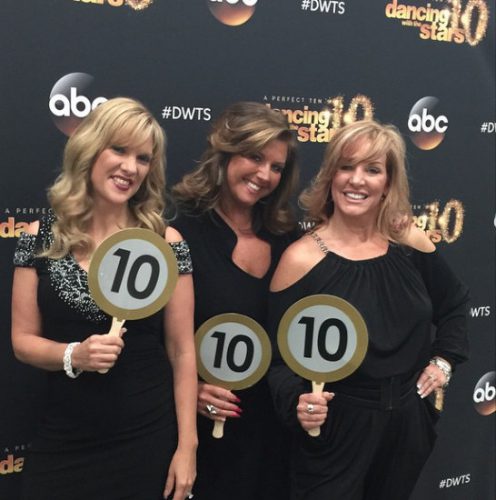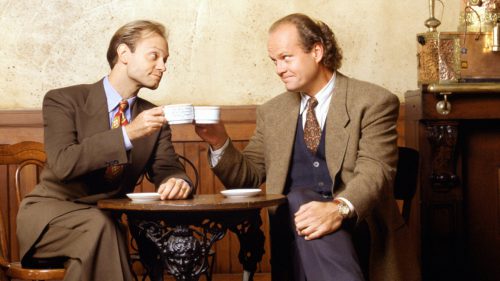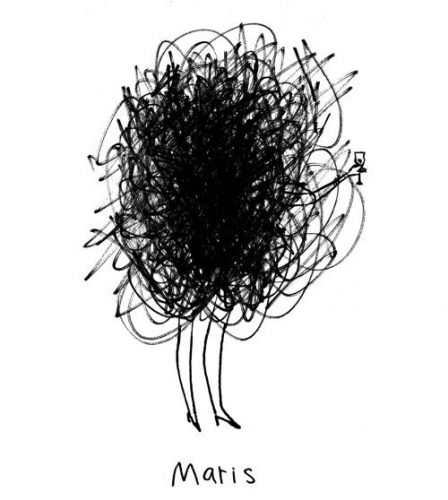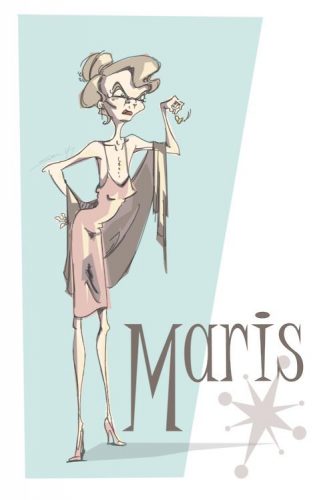
I love being a mom. Motherhood, however, has also savagely birthed a hideous new version of my self into the world.
For example: Parenting has become the most tedious competitive sport since Scotland invented golf in 1457, and yet I frequently run to win it. I’ve even come to view preschool drop-off as a performance opportunity.
SCENE: I tenderly pull my kids from their car seats and immediately transform into the cheeriest, most in-control yet carefree version of “mom” since Carol Brady. I don my overly-priced active wear (the official jersey of mothers everywhere). I offer excessive hugs and kisses, the likes of which my kids pretty much only witness at preschool drop-off. I say things like: “Be kind to your friends, sweetie!” (manners), “Make sure you eat all of your lunch!” (diet), and “I love you!” (that one’s from the heart). Then I tell their teachers to let me know if there’s anything at all I can do to help (selfless as hell). Most importantly, I make sure that all of these affections and gestures are public, as if to say, “See, my kids aren’t being beaten at home. The love I have for them is unquantifiable. Oh, and by the way, I just won this drop-off” [drops mic].

I return to my car after drop-off and for a second think something like, Nailed it! The thought alone brings my tail between my legs. Away from the gaze of my fellow competitors, I morph like Dorian Gray’s picture back into this unsightly new version of my real self – both exhausted and restless, selfish but always required to give, wrought with self-loathing and yet impossibly entitled. Don’t misunderstand me, the love I have for my babies really is unquantifiable. But from the moment I became a mother, I also became someone I didn’t like all that much.
Mary Karr says in her most recent book, The Art of Memoir, that the real self “… growls like a beast and stinks of something rotten.” I’ve come to see that this Other Growling, Stinking Charlotte bears an unfortunate likeness to Maris Crane from one of my favorite TV sitcoms, Frasier (1993-2004).

Frasier follows the two eccentric Crane brothers (Niles and Frasier), their ex-cop father (Martin), and Martin’s quirky British caretaker (Daphne). Maris is Niles’ fragile, domineering, and nearly sociopathic wife. Mrs. Crane, as it were, has no children and (in all eleven years of the show’s running) the audience never actually sees her.
FRASIER: “By the way, where’s Maris? I haven’t seen her all night.”
NILES: “She’s on your bed.”
FRASIER: “My bed?”
NILES: “Yes, she’s asleep under the guests’ coats. She exhausts easily under the pressure to be interesting.”
Maris is absurd. She’s ridiculous. And in my current season of life, I get her. She would rather recline in her bed than stand and do anything else. She prefers darkness to light, shirks at the idea of anyone needing her, has her “public self” perfectly rehearsed, and is always looking for the next quick fix (be it elbow transplants or horseback riding) to heal whatever it is that ails her.
I used to be interesting. Now, I google things like “CoolSculpting.” Thrust into just about any social situation, Maris-me (overcome from the anxiety of “it all”) tends to accidentally drink excessively (from the nerves) and prattles endlessly about things like her incredible children and the most effective sleep training methods (the nerves provoke her competitive side). I return home from such social encounters feeling the bone-cutting sting of that failure to be interesting, and would just as well prefer to disappear under a thick pile of coats.
FRASIER: “I thought Maris was joining us?”
NILES: “Oh, no. I’m afraid Maris is having one of her episodes. In the middle of dressing for the evening, she suddenly slumped down on the edge of the bed in her half-slip and sighed. Of course, I knew then and there that dinner was not to be.”
 Motherhood is a role that’s been played since the dawn of time. It’s been depicted in art, music, film, and religion as one of the most revered positions a woman could endeavor. Billions of women embody this role at any given moment. So why do I so often feel like I am playing a part I’m unsuited for? I don’t think I’m alone in this. Mothers today are overwhelmed, dissatisfied, guilty, pulled in every direction – we are not enough. And we live out most of these feelings and fears (like Maris Crane) alone and unseen. The issue is not that we don’t love being moms. Rather, we don’t love the moms we actually are. Since childhood and throughout pregnancy we had a different, more patient and graceful vision for how we’d play the part.
Motherhood is a role that’s been played since the dawn of time. It’s been depicted in art, music, film, and religion as one of the most revered positions a woman could endeavor. Billions of women embody this role at any given moment. So why do I so often feel like I am playing a part I’m unsuited for? I don’t think I’m alone in this. Mothers today are overwhelmed, dissatisfied, guilty, pulled in every direction – we are not enough. And we live out most of these feelings and fears (like Maris Crane) alone and unseen. The issue is not that we don’t love being moms. Rather, we don’t love the moms we actually are. Since childhood and throughout pregnancy we had a different, more patient and graceful vision for how we’d play the part.
God warned us in Genesis 3 that because of Eve’s betrayal in Eden, our pains in childbearing would be severe. He said “…with painful labor you will give birth to children.” I wonder if He wasn’t also talking about the painful work of making babies into children – a relentless undertaking which asks that we (much like the labor of childbirth) completely surrender our own comfort and desires.
Maris-me makes this beautiful act of submission look more like the medical force-feeding Actual-Maris had to undergo as a child.
The typical day-to-day happenings I don’t share over social media (or in my calculated preschool interactions) go something like this: frustrated, defeated, and worried texts exchanged with my husband; Cookie Crisps for dinner; hours of watching Disney Jr. What you don’t see is my incessant and self-bullying inner-dialogue: “We should be outside right now,” or “I should have them making more art,” and most often, “Who will I care for today? Me, or them?” The answer is (almost) always, them. But the debate is real.
In short, my new self would like on staff a maid, a masseuse, someone to answer her texts and emails, a therapist, a priest, a psychiatrist for her ‘scrips, a nanny to make art with her kids, someone to chat with her husband when he requires social interaction, and Gwyneth Paltrow’s personal chef.
Oh, poor dear Maris.
NILES: “Dad doesn’t get along with Maris.”
FRASIER: “Who does?”
NILES: “I thought you liked my Maris!”
FRASIER: “I do. I – I like her from a distance. You know, the way you like the sun. Maris is like the sun. Except without the warmth.”
Like Florence + the Machine sings, “It’s hard to dance with a devil on your back.” The devil in this metaphor is obviously not me, it’s Maris.

NILES: “Maris found a grey hair!”
FRASIER: “Daphne, get Niles a brandy.”
NILES: “It was right at the apex of her widow’s peak.”
FRASIER: “Better bring the bottle!”
NILES: “She blames me, Dad. She said it’s from the stress I caused her last night when I thoughtlessly turned on the light while she was getting undressed.”
I fear that my husband will look back on our marriage and think something like this:
NILES: “Life with Maris wasn’t so bad. It was my fault, after all! I was too rigid, I was always making demands!”
FRASIER: “No, Niles!”
NILES: “‘Eat something!’ ‘Unlock this door!’ ‘Don’t throw that!'”
The Maris eyeing me in the mirror whispers that the key to relieving my metaphysical angst comes down to things like grains and my sad lack of muscle definition. So I follow a strict Paleo diet and take Pilates classes.
NILES (on the phone): “Yes, yes, Maris, I’m sure. No, no, you can’t gain weight from a glucose I.V. No, no, my little worry wart, there’s no such thing as a NutraSweet drip.”
But none of these things ease the sacred weight of raising children. And so I prefer – as so many mothers do – to either wearily play the part or to hide, to deal with my devil behind closed doors, unseen by any ogling audience.
ROZ: “I don’t see her; maybe she went back out. Oh, wait, I see her coat on a hat rack.”
NILES: “Look closer. Is the hat rack moving?”
ROZ: “Oh my God!”
Motherhood is blessed, and motherhood is hard. One truth doesn’t negate the other.
If I’m being honest, maybe becoming a mother didn’t birth Maris-me from scratch, but rather handed a microphone and an amp to this beast who was always there, snarling and gnashing and biding her time to come out in full force. By the end of Frasier, it’s not hard to see that Maris (in all of her insane glory) is actually no more self-serving, entitled, cold, or ridiculous than any of the show’s protagonists. It is more comfortable to villainize her, however, than to acknowledge that there might be a little bit of Maris Crane in us all.
Perhaps this is why mothers would rather compete, or retreat – because both activities place us safely on the other side of having a problem. In wagging our fingers at Maris, at moms who feed their kids refined sugar, in hiding behind the filters on our Instagram accounts, we avoid having to confront our own inevitable Maris-selves. Doing so might be too dark, too painful; we might incinerate faced with the growling, rotting truth of who we really are.
Like Hagar running from her oppressive mistress, Sarai (Genesis 16), we think we can find freedom in solitude and these false personas. But when the angel of God meets Hagar in the wilderness He says, “Go back to your mistress and submit to her…I will so increase your descendants that they will be too numerous to count” (this was a good thing). God is going to bless her right where it hurts; not while she’s masked, hidden, alone. Hagar responds, “You are the God who sees me.”
Often times, the idea that God might truly know us – fragile yet domineering, loving and sociopathic – is terrifying.
NILES: Maris is unable to have pets. She distrusts anything that loves her unconditionally.
To Hagar, God’s intimate knowledge of her real self is a relief. And it should come as relief to us as well. It means that God sees us (Maris et al.), and He loves us all the same. This doesn’t necessarily mean that the Maris on our backs, the Maris in our hearts, is fully slain. But remembering God’s immeasurable love for us opens our eyes to His manna in the small things: baby kisses, Saturday morning snuggles, and the hilarity of toddler-thoughts. It means we can give grace to ourselves during these severely gorgeous yet painful years of childbearing and child rearing.
As mothers, we sacrifice our needs, our wants, our sleep, our sanity, and some must even carry around the extra weight of a tiny but toxic lady named Maris Crane. God sees us. He knows every word of our shallow and self-serving inner-dialogue. He loves us. And (although “Maris dislikes public displays of rhythm”), He gives us the strength and the song to clumsily tango with these Maris-selves. Over time, and by the grace of the God who sees us, that sting and weight of Maris may get lighter. We may finally begin to look familiar to ourselves again and, in the end (much like our growing children), we will be new and magnificently changed.

COMMENTS
3 responses to “Motherhood and the Maris Crane in Me”
Leave a Reply













I read this just after dropping my son off for pre-school. Oy vey! So close to home. Beautiful, C.
Life is blessed and life is hard. For most people. It’s not limited to motherhood, but so many mothers seem to think it is and volunteer to be martyrs and seek praise. You aren’t martyrs. You chose this life. Deal with it. Just like the rest of us do, with no praise or care.
I couldn’t agree with you more on your first statements, India. Life is blessed and life is hard for all of us. For this season of my particular life, that blessedness/hardness has been amplified by motherhood. I suppose I’d be writing a similar article if I started my own business (having no prior experience or education in finance, actually owning a business, employee management, etc). I’d be an unprepared mess, “faking it till I made it.” The point is that some life-experiences, no matter how universal, no matter how much we wanted them, bring out our true natures (totally flawed). For me, being a mom has at times brought out the worst. Praise Jesus that His grace is enough to cover it.